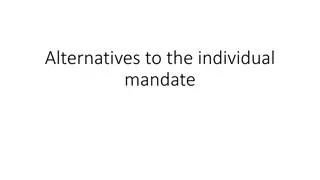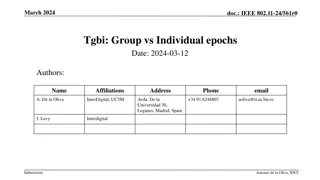Determinants of Health: Understanding Factors Influencing Well-being
Health is a state of physical, mental, and social well-being, free from disease and infirmity. Determinants of health include heredity, environment, lifestyle, and socio-economic conditions. These factors can influence individual and population health outcomes, impacting overall quality of life. Pol
1 views • 31 slides
Federal Learning Account Program: Enhancing Individual Training Rights
Explore the Federal Learning Account Program focusing on individual training rights, including the right to an individual training plan, sectors with collective bargaining agreements on education, and employer responsibilities in providing training opportunities. Discover practical tips for particip
2 views • 34 slides
The Main Factors That Influence the Consumer Buyer Behavior
Consumer buyer behavior is influenced by various factors such as cultural, social, personal, and psychological elements. Culture, social factors like family and opinion leaders, personal factors such as age, occupation, lifestyle, and personality, as well as psychological factors like motivation, pl
2 views • 8 slides
Factors Influencing Ethical Decision-Making in Business Administration
This presentation explores the various factors that influence ethical decision-making, focusing on significant individual factors such as personal moral philosophy, stage of moral development, motivation, gender, and experience. It emphasizes how individual, organizational, and opportunity factors c
9 views • 12 slides
Analysis of Individual Risk Factors in Ventral Hernia Repair Outcomes
This study explores the impact of various risk factors on predicting adverse outcomes of ventral hernia repair using data from the Abdominal Core Health Quality Collaborative (ACHQC). The research aims to quantify and compare the influence of different factors, hypothesizing that hernia- and procedu
0 views • 14 slides
Importance of Maintaining Individual Rights in Effective Care
Recognizing and upholding an individual's rights is crucial for providing effective care. It ensures the individual feels respected, valued, and supported, contributing to a trusting relationship. Failure to meet these rights can lead to negative consequences impacting the individual's well-being an
0 views • 32 slides
Understanding Individual Employment Plan (IEP) and Individual Service Strategy (ISS) in WIOA Training Academy
Individual Employment Plan (IEP) and Individual Service Strategy (ISS) are essential components of the WIOA Training Academy, tailored to meet the career needs of participants under various WIOA programs. IEPs focus on personalized career services for adults and dislocated workers, while ISSs are sp
1 views • 23 slides
SUD Life Century Gold - Individual Saving Life Insurance Plan
SUD Life Century Gold is a Non-Linked, Non-Participating Individual Savings Life Insurance Plan offering flexibility in policy and premium paying terms. It provides two plan options - Goal Sure and Edu Sure, with guaranteed additions and tax benefits under Section 80C and Section 10(10D) of The Inco
0 views • 13 slides
The Debate of Nature vs. Nurture in Personal Development
The nature vs. nurture debate in personal development explores the influence of genetic and biological factors (nature) compared to social, economic, and environmental factors (nurture). It raises questions on whether genetics or environment plays a stronger role in shaping behaviors, intelligence,
0 views • 14 slides
Overview of Performance Management Systems and Competency Mapping
Performance Management Systems (PMS) play a crucial role in ensuring organizational objectives are met through individual contributions. This entails continuous improvement at all levels - individual, team, and organizational. Managing performance is vital for survival and growth in a competitive en
3 views • 45 slides
Influences of Individual Characteristics on Health: A Critical Exploration
This session delves into the various influences on health at an individual level, examining factors such as developmental, social, and psychological elements. It explores the impact of foetal development, teratology, and foetal programming on long-term health outcomes, emphasizing the intricate rela
0 views • 20 slides
Understanding Environmental Factors in Terrestrial and Aquatic Environments
Environmental factors play a crucial role in shaping ecosystems. In both terrestrial (land) and aquatic (water) environments, organisms are influenced by abiotic factors such as temperature, light intensity, and pH, as well as biotic factors like plants, predators, and competitors. Understanding the
4 views • 19 slides
Factors Affecting Microbial Growth in Food: Intrinsic and Extrinsic Factors
In food, microbial growth is influenced by intrinsic factors like pH, water activity, nutrient content, and extrinsic factors such as environmental conditions. The pH level, moisture content, and water activity play crucial roles in determining the growth of microorganisms, with specific ranges affe
0 views • 23 slides
Understanding Fundamental Rights in the Indian Constitution
Fundamental rights are crucial for developing an individual's personality and dignity in society. The Indian Constitution grants six fundamental rights, including equality, freedom, and protection against exploitation. Despite certain limitations, these rights are essential for upholding individual
0 views • 10 slides
Factors Influencing Customer Choice: Psychological, Sociocultural, Economic, and Government Factors
Psychological factors, such as perception and lifestyle, play a key role in customer choice. Sociocultural influences from society and culture also impact decisions, while economic factors like income levels and government policies can sway customer preferences. Understanding these factors is crucia
0 views • 18 slides
Understanding Human Behavior: Foundations and Factors
Human behavior is a multifaceted subject influenced by genetic makeup, culture, and individual values. It encompasses both overt actions and covert thoughts, a product of the individual and environmental factors. Psychologists study behavior from visible (overt) actions like playing football to inne
0 views • 20 slides
Understanding Human Nature and Individual Differences in Foundation of Human Skills
Explore the foundational concepts of human behavior, individual differences, and organizational culture in the study of human skills. Delve into topics such as human nature, personality, attitudes, intelligence, and learning in Prof. Muskan Jeswani's course. Understand the significance of inter- and
0 views • 11 slides
Comprehensive Guide to Factorization in Mathematics
Explore the concept of factorization in algebraic expressions, including the definition of factors, common factors, methods of factorization, and illustrated examples. Learn about finding factors, common factors, and various factorization techniques such as common factors method and regrouping of te
0 views • 13 slides
Understanding the Development of Fears: Individual and Parental Influences
Exploring the impact of individual characteristics and parental dispositions on learned animal fears, this study delves into the prevalence of phobias, the development of fears and phobias, fears through the transmission of information, and the role of these factors in childhood fear acquisition. Th
0 views • 23 slides
Methods to Evaluate Benefit-Risk Trade-Off in Individual Patients
Evaluating benefit-risk trade-offs in individual patients is crucial for making informed treatment decisions, especially when safety concerns arise with new therapies. This involves developing statistical algorithms to identify cases where potential harm outweighs benefits, as illustrated in the TRA
0 views • 26 slides
Insights on Culture, Taste, and Society by Pierre Bourdieu
Pierre Bourdieu's work in "Distinction: A Social Critique of the Judgement of Taste" delves into the intricacies of cultural practices and societal classifications of taste. He explores how lifestyles become sign systems qualified by social distinctions, influenced by habitus and symbolic capital. B
0 views • 16 slides
Advanced Techniques in Relational Data Outlier Detection
This document delves into cutting-edge methods for outlier detection in relational data, focusing on profile-based and model-based approaches such as leveraging Bayesian networks, feature generation, and individual feature vector summarization. The examples provided showcase the application of these
1 views • 30 slides
Debating Alternatives to the Individual Mandate in Healthcare Reform
Recent bipartisan discussions have called for exploring alternatives to the individual mandate in healthcare, citing its unpopularity and criticisms of being coercive or ineffective. The industry supports the mandate but believes it should be better enforced. Studies suggest that eliminating the man
0 views • 16 slides
Analyzing Inequality Trends Using NTA at Individual Level
NTA (National Transfer Accounts) methodology is utilized to measure levels and trends in inequality at the individual level by adjusting age profiles and estimating adjustment factors. By studying distributions of individual outcomes and exploring factors contributing to inequality, questions like t
0 views • 44 slides
The Influence of Social Context on Behavior in Social Psychology
Explore the impact of social surroundings on individual behavior in social psychology. From the power of influencers like parents, media, and peers to the shocking levels of obedience uncovered in studies such as the Milgram Experiment and Solomon Asch's Conformity research, this lecture delves into
0 views • 16 slides
Enhancing Individual Protective Factors in Youth Leisure Time
In exploring the impact of leisure time on social and economic exclusion, Lena Hernandez Modin emphasizes the importance of protective factors such as relationship-building skills, social networks, and close relationships. By focusing on individual strengths, leisure activities can serve as a vital
0 views • 8 slides
Ecological Factors and Climatic Influences on Plant Life
Ecological factors play a crucial role in shaping the environment for organisms to thrive. This includes living (biotic) and non-living (abiotic) components like climatic factors, edaphic factors, topographic factors, and biotic factors. Climatic factors such as light, temperature, water, wind, and
0 views • 14 slides
Discussion on IEEE 802.11 Group vs. Individual Epochs
Trigger discussion on differences between group and individual epochs in IEEE 802.11 standards. Group epochs involve simultaneous transitions of MAC parameters by all or selected STAs based on AP trigger, while individual epochs allow each STA to independently change its parameters. Key points inclu
0 views • 4 slides
Understanding Environmental and Psychological Factors in Crime Causation
Upbringing, poverty, and peer pressure are environmental factors influencing criminal behavior, while abusive relationships, mental health issues, and learning difficulties are psychological factors. These factors shape individuals' moral choices and contribute to criminal activities, raising questi
0 views • 7 slides
Influence of Personal Demographic and Institutional Variables on Venture Creation in Small Technology-Oriented Ventures
This research study explores the impact of personal demographic and institutional factors on venture creation in small technology-oriented ventures. It delves into the influence of individual characteristics like age, gender, education, and social institutions such as family role models on entrepren
0 views • 39 slides
Understanding Factors and Prime Factors in Mathematics
Explore the concept of factors and prime factors through practical scenarios involving Jedward, stationary supplies, and school choirs. Learn how to find factors of numbers like 18 and 30, identify prime numbers, write numbers as products of prime factors, determine common factors, and calculate low
0 views • 19 slides
Understanding Mesopic Factors in Roadway Calculations
Exploring the incorporation of mesopic factors into roadway calculations and how different design luminance ranges and Scotopic/Photopic (S/P) ratios interact with various calculation methods. The discussion includes factors as defined in TM-12 and proposed for RP-8, along with IES RP-8's Mesopic Fa
0 views • 37 slides
Gandhian Model of Sustainable Individual Behavior in the Globalized World
The Gandhian model of sustainable individual behavior, as advocated by Prof. Vidya Jain, emphasizes nonviolence, peace, and harmony in a world plagued by globalization, conflicts, and intolerance. Drawing on Gandhi's principles from Hind Swaraj, the paper explores how fostering nonviolent societies
0 views • 30 slides
Balancing Individual Autonomy and Public Health in Surveillance
Public health measures such as surveillance, notification, mandatory testing, and isolation may conflict with individual autonomy. Respecting autonomy is crucial for promoting well-being, but there are situations where overriding individual autonomy is necessary for the common good of society during
0 views • 15 slides
Understanding NHS Job Evaluation Scheme and Rebanding Process
NHS Job Evaluation Scheme provides a structured approach to assess job roles based on factors like communication, patient care, knowledge, skills, and physical effort. It uses a set of rules called JE factors to categorize job demands without focusing on the individual's performance. The scheme incl
0 views • 9 slides
Factors Influencing Gestation Length in Various Animals
This comprehensive guide explores the factors affecting gestation length in different animals, including cattle, mares, sheep, goats, camels, buffaloes, dogs, and cats. It covers factors that prolong gestation, such as genetic factors, deficiencies in minerals and vitamins, anomalies in the fetus, a
0 views • 18 slides
Understanding Health Insurance in Challenging Times
Learn about different types of health insurance products such as hospitalization plans, individual and floater health insurance, senior citizen health insurance, and more. Discover tips for choosing the right coverage, whether to opt for individual or floater policy, and key factors to consider whil
0 views • 20 slides
Cross-National & Cross-Cultural Risk Factors for Offending
Explore key risk factors for offending across nations & cultures, analyzing homicide rates, structural differences, individual/family factors, and the generalizability of crime risk factors. Learn about findings related to impulsivity, achievement, conduct problems, family supervision, parenting sty
0 views • 13 slides
Factors Influencing Voting Behavior: A Comprehensive Analysis
This essay evaluates various factors influencing voting behavior, including media, social class, age, gender, geography, ethnicity, party leader image, issues, rational choice, party affiliation, tactical voting, dealignment, third-party choices, and non-voting. It discusses the relative importance
0 views • 12 slides
Efficiency Tradeoff Between Class Adjudication and Individual Arbitration
Efficiency tradeoff between class adjudication and individual arbitration analyzes the enforcement of individual arbitration over class actions in the United States, highlighting the defense bar's advocacy for class action waivers and arbitration of individual claims. The Federal Arbitration Act's i
0 views • 9 slides







































